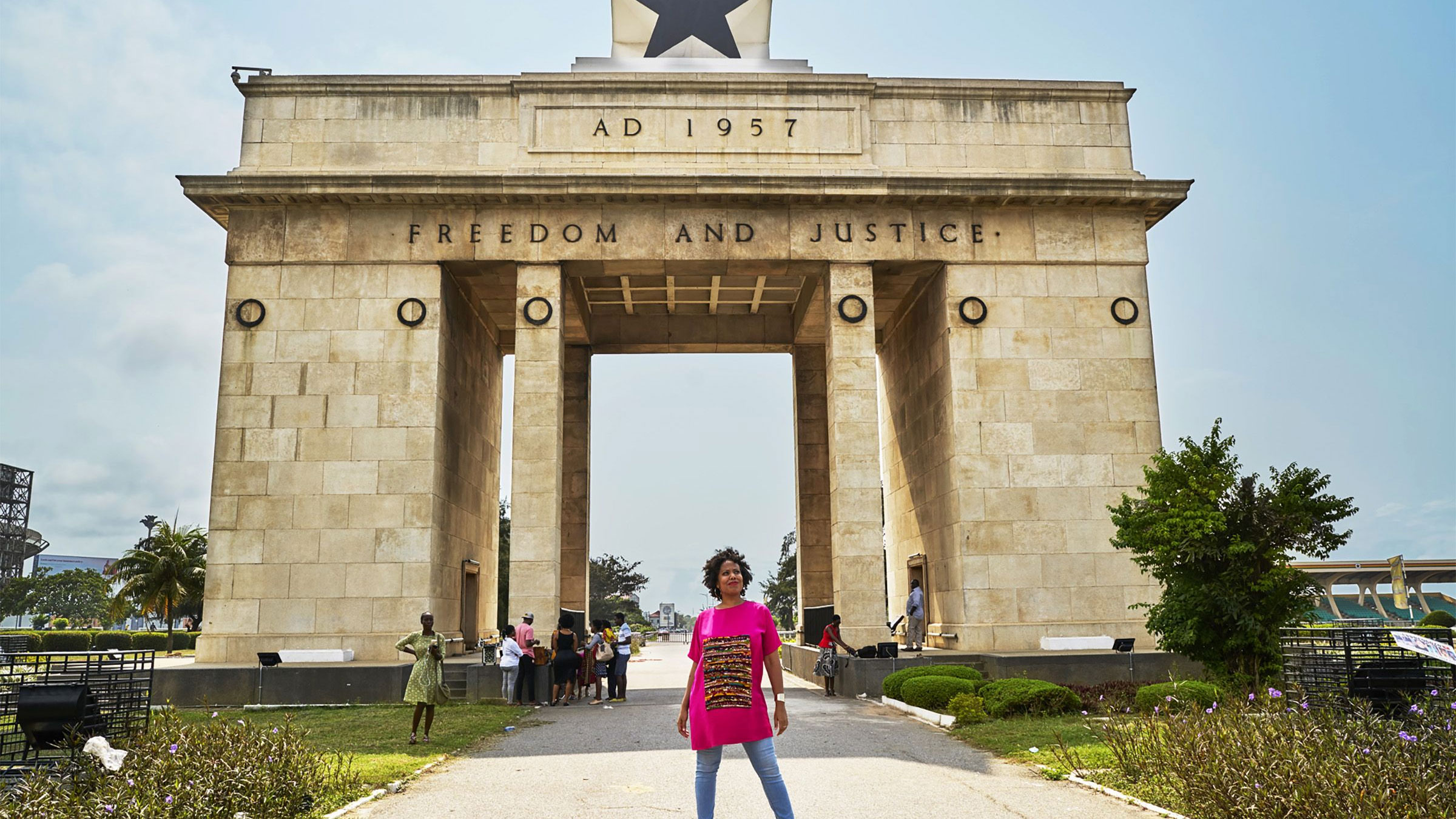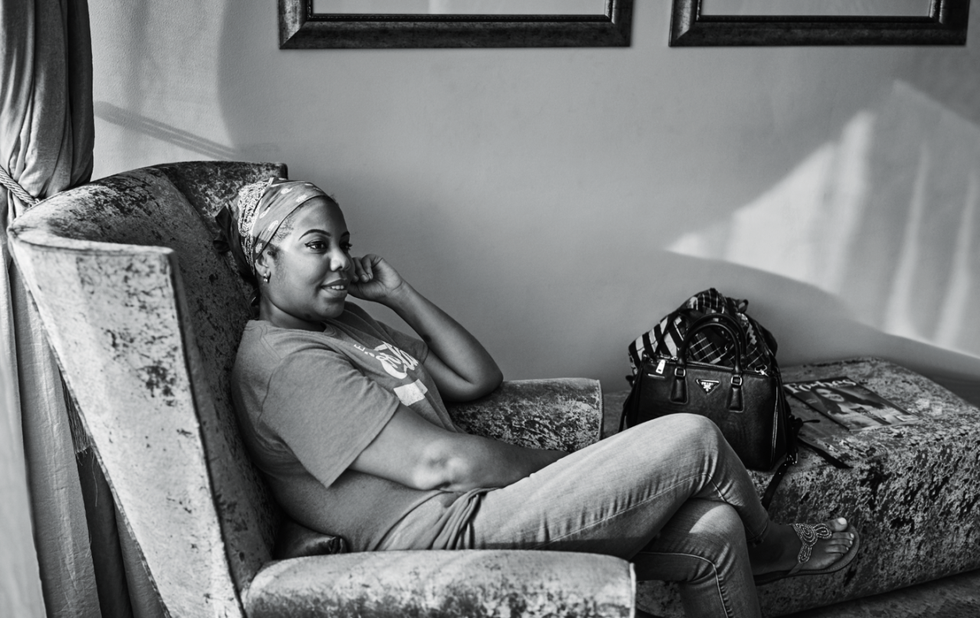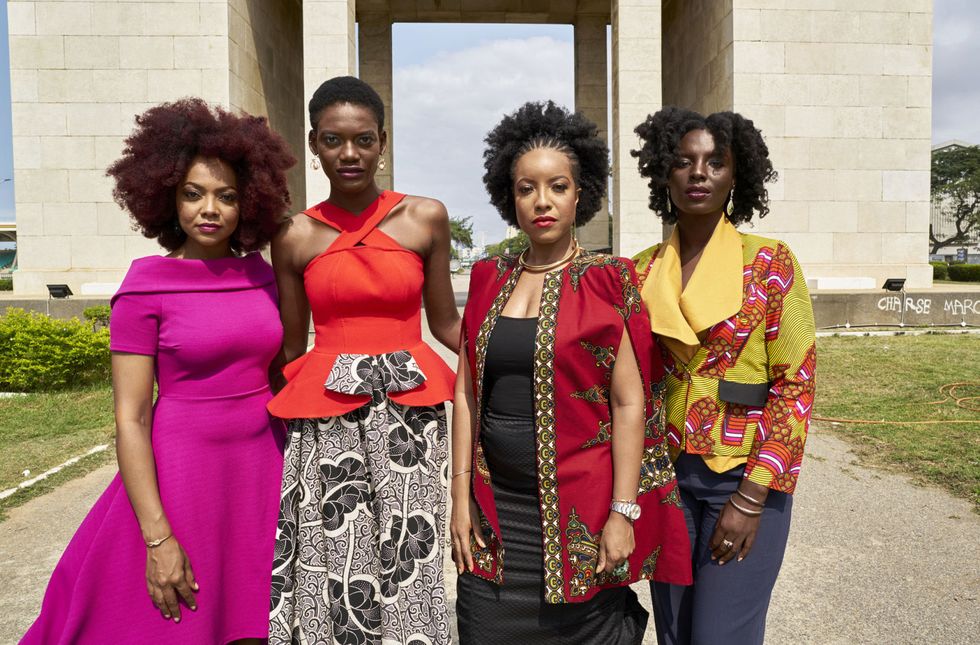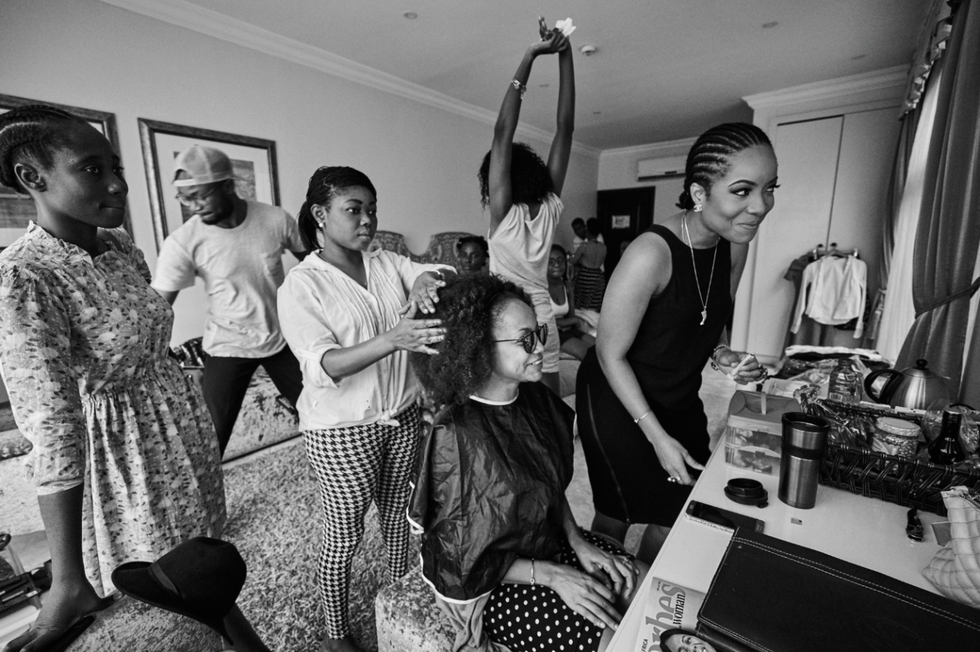Meet the Shonda Rhimes of Ghana
Director Nicole Amarteifio is building a TV empire in Accra with the goal of redefining how the world sees African women.

On a muggy Saturday in July, actress Joselyn Dumas is pacing the set of The Republic in Ghana's capital city, Accra, trying to decide how to hold her purse. The director, Nicole Amarteifio, wearing fuchsia Nikes and a gray shirt reading Black Girls Are from the Future, nods as her lead actress begins to channel a woman thousands of miles away. "You know who I see in this scene?" Dumas asks. "Viola Davis in How to Get Away With Murder. I see it! You know, this is how she holds her bag... " With that, Dumas stomps off, bag clenched in her fist. At a bend in the hallway, she pauses, rethinking her approach—maybe her character is more of an Olivia Pope, the lead character played by Kerry Washington on Scandal. Amarteifio agrees, and this time when Dumas walks, she swishes back and forth, all hips and pouty lips. "No one spends this much time shooting a pilot," says Mawuli Gavor, an actor on the show. "Nicole does every take until it's perfect."
Amarteifio has reason to aim for perfection—television executives in the U.S. and millions of viewers worldwide are watching. Known as the "Shonda Rhimes of Ghana"—a nickname referencing the powerhouse creator and showrunner behind hits like Grey's Anatomy, Scandal, and How to Get Away With Murder—Amarteifio is a symbol for the future of African entertainment. Best known for An African City, the 2014 web-based series that set the girlfriends-navigate-love-and-career premise of Sex and the City in Accra, the 34-year-old is countering the stereotype that often portrays African women as a poor, tragic monolith. "I'm really trying to change that narrative," Amarteifio says. "To show a representation of black women that you rarely see."

Amarteifio relaxes in a hotel room in Accra between shoots
So far, her efforts have been rewarded. The first season of An African City has drawn the attention of the media and more than 3 million YouTube viewers to date, and the second, which aired on the fee-based video platform VHX, made $20,000 in its first month (viewers pay $20 each to watch the season). Now, Amarteifio hopes to build on that success with her latest series, The Republic, which again centers on a gutsy woman: this time, a political fixer (like Pope on Scandal) who takes on cases inspired by real-life headlines in Accra. The pilot episode premieres this fall on VHX, and Amarteifio is shopping the series around to American networks and streaming services, including Netflix, where she first pitched the idea. If Amarteifio is successful in placing the show, The Republic stands to become the highest-profile African series to date, bringing her stereotype-busting characters to a global audience.
"'The Republic' stands to become the highest-profile African series to date, bringing her stereotype-busting characters to a global audience."
Amarteifio may be one of Africa's better-known directors, but she's hardly without competition. In Nigeria, where the film industry has been dubbed "Nollywood," producers have been churning out movies for decades. The industry is now the country's second-largest after agriculture, employing around 1 million people and pumping out thousands of films a year. In 2009, Nigeria surpassed the U.S. to become the second-largest film-producing country in the world. (India's mega-prolific film industry tops the list.) South Africa's "Joziwood," founded in Johannesburg, has contributed $200 million to the country's GDP. Its biggest claim to fame is District 9, a 2009 sci-fi thriller filmed locally and directed by a native South African, which was nominated for Best Picture at the 2010 Academy Awards. But booming or not, African film centers aren't known for glamorous sets or million-dollar movies. Entertainment is seen as a cheap commodity, with films and shows made on tight budgets, often by people working nearly for free.
Ghana's burgeoning film scene, called "Gollywood," is the continent's third-largest, but it's tiny in comparison, producing about 100 films a year. Funding is a constant challenge, with producers rarely able to secure money for projects or to get TV stations to pay to air them when they do. Station executives more often opt to buy inexpensive and reliable fare from abroad, like telenovelas from Mexico and soap operas from India, which helps explain why African shows hardly ever penetrate outside the continent—and why Netflix's arrival there earlier this year is a game changer.
Founded in the U.S. in 1997, Netflix began its international push in 2010 when it launched in Canada. By the end of 2015, it was streaming in more than 60 countries, including all of Latin America and Western Europe, Australia and New Zealand, and its first Asian country, Japan. The additional countries grew Netflix's subscriber base from 20 million in 2011 to more than 69 million in 2015. Its global hits so far include Netflix's first Spanish-language original series, Club de Cuervos, a soccer-themed dramedy that is expected to return for a second season this fall, and the company's first foreign-made Netflix Original, Brahman Nahman, a raunchy comedy that premiered in July from the Indian director Q. (Eventually Netflix wants to make "the best Bollywood movie that's ever been produced," CEO Reed Hastings recently told an Indian publication.)

'The Republic' cast (from left) Jasmine Baroudi, Briggette Appiah, Joselyn Dumas, and Maame Adjei
Also in 2015, speculators aware of Netflix's global ambitions hypothesized an Africa launch limited to South Africa and potentially a few other of the richest countries. But in January 2016, Hastings made a surprise announcement to the journalists and techies gathered at the Consumer Electronics Show (CES) in Las Vegas: "[We are now] in nearly every country in the world"—190 to be exact, including all 54 African nations. (Among the few remaining countries without Netflix are China, Syria, and North Korea.) Included in the stealth rollout were plans to spend big on content in 2016—$6 billion, a 62 percent increase from the $3.7 billion Netflix spent in 2014—and to use a hefty portion to expand its global offerings, in part by acquiring the rights to locally made shows. The enthusiasm on the ground in Africa was palpable. "They're saying, 'Netflix in Africa!'" says Ghanaian filmmaker Shirley Frimpong-Manso. "People think, Oh, my God! Finally! We're going to get a lot of money!"
Get exclusive access to fashion and beauty trends, hot-off-the-press celebrity news, and more.
Amarteifio has her own reasons to be excited. Around the same time that Hastings made his CES announcement, she was invited to discuss original African content with executives at Netflix's headquarters in Los Gatos, California. When asked to pitch ideas beyond a third season of An African City, she used the formula that had worked so well the first time: retrofitting a tried-and-true American show for African audiences. Her strategy is meant to hook viewers who might otherwise not watch a show about Ghana, but it also helps her learn the ropes of an industry in which she has no formal training—a sort of directing by trace paper. She pitched her vision for The Republic, left with positive feedback, and went home to film the pilot. (Netflix declined to be interviewed for this piece.)
In many ways, life on the set of The Republic feels more Hollywood than Gollywood: the catered meals, a clipboard-toting intern trailing the director, an in-house stylist, Afua Rida, who maintains an on-set wardrobe by local designers. (Elsewhere in Ghana, actors are often expected to bring their own clothes to set.) And, of crucial importance to the cast and crew, there are paychecks. (Amarteifio self-funded the first season of An African City and is using the proceeds she made on VHX to film The Republic.) But even as Amarteifio has raised the standards, she still faces countless obstacles. Securing locations can be tricky, as some property owners demand exorbitant fees and public officials can withdraw approval on a whim. Last- minute red tape, for instance, meant the flashiest Republic shoots, at the Parliament House and Independence Square, had to be rescheduled. The challenges "can be frustrating," actor Mawuli Gavor says, adding, "You want to make good work, but you know there are limitations."
Still, Amarteifio is all about rewriting what's possible in Ghana. Born in Accra, she decamped as a 3-month-old with her family in the spring of 1982, driven away, as were many Ghanaians, by a series of political coups. They lived in London for six years before settling in Westchester County, New York. She was one of a few Africans at Scarsdale Middle School where, during a lesson on HIV/AIDS, she remembers a classmate saying, "To solve the problem, all you have to do is blow up the continent of Africa." The remark "started to guide me into what I had to do," Amarteifio says. "I had to make it so that other 12-year-old African girls sitting in Westchester would not be trapped in conversations where that sentiment is brought out." She went on to earn a bachelor's degree in African Studies at Brandeis University in Massachusetts and a master's in corporate communications at Georgetown University, after which, in 2010, she took a job with the World Bank in Washington, D.C., coordinating Africa-focused social-media campaigns.
By 2012, as the U.S. was still feeling the aftershocks of a massive recession, Ghana seemed full of promise, thanks in part to a deep oil well that had been discovered off its southern coast. Drawn to the surge of money and opportunity, Amarteifio packed her bags and moved back, joining the so-called global returnee movement—the term for a reverse migration of people educated abroad to their home countries. (Her parents had returned in 1997.) "I always felt Ghana was home," she says. "From when I was a child, I knew I wanted to come back. Whether it was the kind of food my mom was making or my grandmother telling us stories, I just knew that there was somewhere called 'home.'"
When Amarteifio arrived in Accra, she continued to work for the World Bank remotely, but within months, she says, she felt a familiar pull, rooted in that defining moment in middle school, to tell stories about people like her. She remembered when she had told a professor at Georgetown about her idea for someone, somewhere, to translate Sex and the City in a Ghanaian context. The professor had told her to be that someone and "just start writing," she recalls.
"From when I was a child, I knew I wanted to come back. Whether it was the kind of food my mom was making or my grandmother telling us stories, I just knew that there was somewhere called 'home.'"
Material for the show came easily. Like Amarteifio, all of the main characters on An African City are returnees, and the experiences they have on-screen—coming to terms with local romantic customs and coping with the feeling of never being Ghanaian or American enough—mirror what she and her friends were facing in reality. "If I tried to just write the Ghanaian story, I could see people saying I had no right," Amarteifio says. "But the returnee's experience—no one could tell me that I can't write that story." Fans wrote in from around the globe to praise her fresh portrayal of African women, starting with showing their natural hair. Black women have historically been "seen on-screen through the eyes of another ethnicity," she says. "That's why I'm so happy to be a black woman [doing this work] today. [Viewers] are seeing things through our eyes, and there's a lot of fun in that."

Cast members of 'The Republic' during a hair-and-makeup session
The actresses Amarteifio found via casting calls in New York City and Accra tended to be returnees, too, and understand the hybrid life intimately. Joselyn Dumas, who plays Amerley—the fixer at the head of The Republic's fictional Black Star private investigation firm—was a paralegal in Virginia until 2008, when she returned to Ghana and, in short order, became a movie star. Soon she had her own Oprah-like talk show, broadcast nationally. Four years later, she was nominated for an Africa Movie Academy award, an event modeled after the Oscars, complete with its own iconic statuette. She's now known throughout Africa, with nearly 700,000 Instagram followers. Maame Adjei, who stars in both An African City and The Republic, was training for a career in health-care finance in Philadelphia before she moved back to Ghana. Amarteifio saw her in a restaurant and recruited her into acting. (She agreed to pursue acting partly because Amarteifio mentioned she could pay her, which, Adjei says, signaled to her that the project was serious.) The whiplash speed with which a returnee's life can change makes it easy to understand the appeal of going back. As Gavor, the actor playing Amerley's associate, who went from attending a small-town Pennsylvania college to becoming a rising star in Nollywood, puts it: "You can live a decent life in someone else's country, or you can live like a king in your own."
"My mission is to change the way the world sees African women."
The Republic picks up where Amarteifio's first series left off in showcasing the tensions and lifestyles of Ghana's elite, but instead of trendy restaurants and shops, the setting is Parliament, and women are in positions of power, collaborating and conspiring with people at the highest levels of government. The pilot episode, for instance, grapples with the country's tolerance of marital indiscretions when a faithfully married minister hires Amerley to stir up rumors of infidelity to make him seem more macho. ("Only the Americans get in a frenzy over where their government officials put their dicks," Amerley says in one of the episode's many racy lines.) Another through line, carried from An African City, is a rethinking of beauty norms. Dumas appears in an Afro in The Republic pilot, a sight still rare in Hollywood. (Even in How to Get Away With Murder, Amarteifio points out, Viola Davis' character "only takes off her wig at night.")
The scenes are shot in a grab bag of superlative locations, from one of the tallest skyscrapers in the city to the surreally striking Independence Square. By beaming out Accra's glossier side—its high fashion, thriving music scene, and most glamorous spots—Amarteifio aims to alter the way the world sees Africa and its women. "Walking the halls of the World Bank, the African woman I saw depicted was poor, she needed HIV treatments, she was weak, she needed help with education," she says. "My mission is to change the way the world sees African women"—and, thus, how black women everywhere see themselves. She hopes to counter the stereotype by broadcasting another image across the world: that of the upwardly mobile African elite woman.
In the process, Amarteifio is also finding her voice. She sees her current model of mimicking American story templates as a stopgap on the path to creating original work. She recalls a conversation she had with Shonda Rhimes when the two met at a TED conference earlier this year. Amarteifio spoke onstage about An African City, and afterward, Rhimes approached her with words of support. When Amarteifio revealed what people call her back home, Rhimes gave her the ultimate director's note: "You have to be the Nicole of Ghana."
This article appears in the October issue of Marie Claire, on newsstands now.